Table of Contents
Mental health issues like anxiety and depression affect many Americans. Sleep hypnosis for anxiety and depression relief is seen as a hopeful alternative. It offers relief to those facing emotional struggles. Relieving anxiety and depression can significantly improve your sleep quality by calming your mind and reducing stress, helping you rest more peacefully. A 2016 study with 57 participants showed hypnosis changes the brain. It affects areas linked to better emotional control and less self-consciousness. This research points to sleep hypnosis as a way to help with mental health. Sleep hypnosis for anxiety and depression relief is a whole-body approach to mental health. Trained therapists guide patients into a calm state. They help change negative thoughts and build better mental responses. The American Society of Clinical Hypnosis (ASCH) sets high standards for hypnosis practitioners. They need 40 hours of training and two years of practice. This ensures they can help manage mental health effectively. New studies keep showing sleep hypnosis’s potential as a treatment. It’s a fresh way to tackle anxiety and depression, alongside traditional therapy. This method is seen as both new and effective.
1 Understanding the Connection Between Sleep, Anxiety, and Depression
Depression can change how we sleep, making us sleep more or less. It’s a big deal because our mental health and sleep are closely linked. This creates a cycle of emotional and physical challenges. 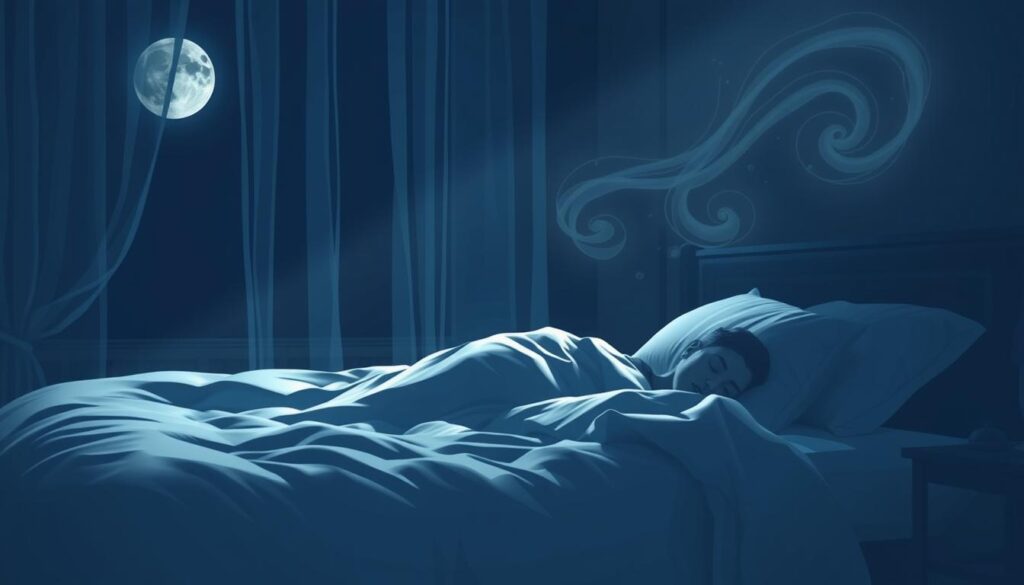 Studies show that sleep issues and mental health are closely tied. Can depression make you sleep more? It’s not a simple yes or no. It really depends on the person.
Studies show that sleep issues and mental health are closely tied. Can depression make you sleep more? It’s not a simple yes or no. It really depends on the person.
Depression can lead to significant changes in sleep patterns. For some people, it can result in hypersomnia, where they sleep excessively, often for longer than usual, because their body is trying to cope with the emotional and physical toll of depression.
This is not true for everyone, as some individuals with depression may experience insomnia or trouble falling asleep. However, those who sleep more may find themselves stuck in a cycle of poor sleep, which can exacerbate feelings of fatigue, sadness, and emotional distress.
Studies show that addressing both the mental health aspect and the sleep disturbances in a comprehensive way can break this cycle. Sleep hypnosis has been shown to help with both aspects, helping people not only sleep better but also manage their depression more effectively.
How Sleep Disorders Impact Mental Health
Sleep problems can really hurt our mental health. People who don’t sleep well might feel:
- More emotionally vulnerable
- Less sharp mentally
- More stressed
- Struggle to control their mood
Tracking sleep through objective measures like polysomnography or wearable actigraphy provides critical insights into sleep patterns, duration, and quality, enabling the assessment of sleep disorders and their impact on overall health.
[lasso id=”13″ link_id=”192″ type=”table”]
The Cycle of Poor Sleep and Emotional Distress
Sleep and mental health go hand in hand. Bad sleep can lead to anxiety and depression. At the same time, these conditions can make sleep worse.
*Sleep is the golden chain that binds health and our bodies together.*
Biological Mechanisms Behind Sleep and Mood
Our brain’s chemistry is key in linking sleep and mood. Things like how our brain sends signals and balances hormones play a big role.
| Sleep Characteristic | Impact on Mental Health |
|---|---|
| Sleep Duration | Directly influences mood stability |
| Sleep Quality | Affects emotional regulation |
| Circadian Rhythm | Modulates psychological functioning |
Knowing how sleep and mood are connected helps us find better ways to deal with depression and sleep issues.
2 What is Sleep Hypnosis and How Does it Work
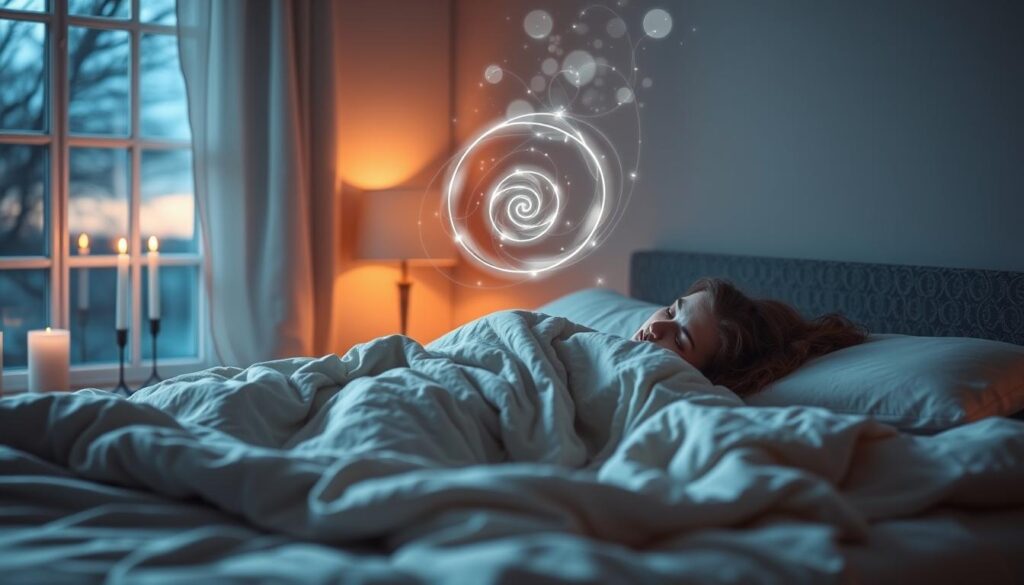 Sleep hypnosis for depression is a special way to help people with mental health issues. It uses guided relaxation and positive suggestions. This method helps the mind relax deeply, making it open to helpful ideas. Sleep hypnosis for anxiety and depression relief works by reaching the subconscious mind in a trance state. It lets experts give healing suggestions that can help with depression. About 70% of people see big improvements in anxiety and depression with this method.
Sleep hypnosis for depression is a special way to help people with mental health issues. It uses guided relaxation and positive suggestions. This method helps the mind relax deeply, making it open to helpful ideas. Sleep hypnosis for anxiety and depression relief works by reaching the subconscious mind in a trance state. It lets experts give healing suggestions that can help with depression. About 70% of people see big improvements in anxiety and depression with this method.
[lasso id=”1640″ link_id=”193″ ref=”amzn-sleep-hypnosis-in-space”]
“Hypnosis is not about controlling someone’s mind, but about helping them access their inner healing potential” – Clinical Hypnotherapy Expert
- Targets underlying psychological patterns
- Promotes deep relaxation
- Reduces mental health barriers
- Enhances overall emotional regulation
Key parts of sleep hypnosis include:
- Creating a calm, focused mental state
- Going around conscious resistance
- Introducing positive thoughts
- Managing stress
Studies show that about 40% of people with sleep issues also have anxiety or depression. Sleep hypnosis could be a great help for them. It tries to stop bad thoughts and help the mind heal when it’s most open.
3 The Science Behind Sleep Hypnosis for Mental Health
Sleep hypnosis for anxiety and depression is where science meets psychology. It shows how this method changes our brain and improves our mental health. 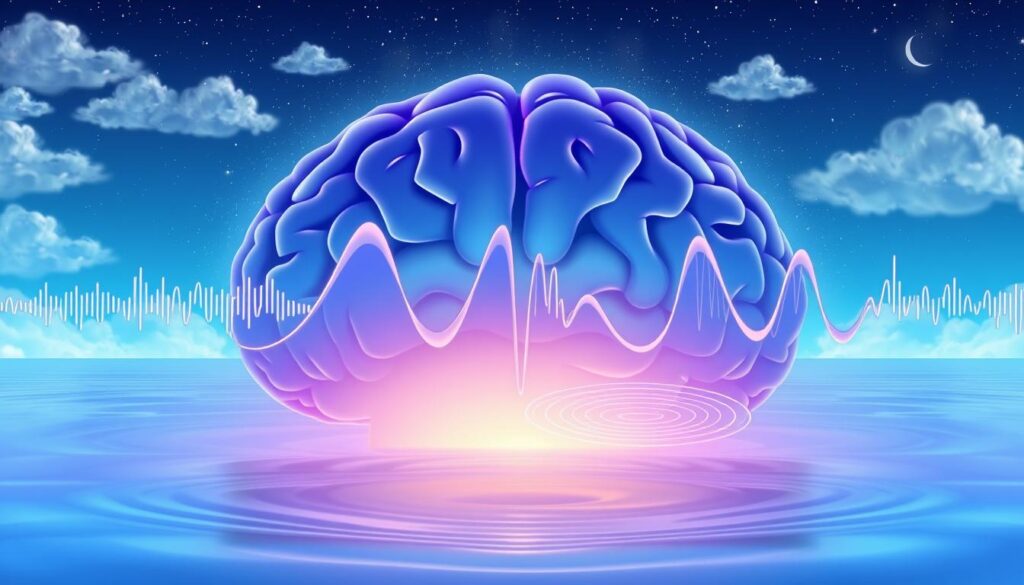
Brain Wave Patterns During Hypnotic States
Recent studies have found special brain changes during sleep hypnosis. They found:
- More theta waves mean deeper relaxation
- The parasympathetic system gets stronger
- Less activity in parts of the brain that worry us
Neurological Changes During Hypnotherapy
Brain scans show big changes in the brain during sleep hypnosis. Certain areas of the brain change a lot:
- The dorsal anterior cingulate cortex gets quieter
- The dorsolateral prefrontal cortex gets busier
- The insula’s connections change
Research-Backed Evidence
“Sleep hypnosis is a strong tool for changing our brain and healing our emotions.” – Dr. Michael Jensen, Neuropsychology Research Institute
Studies prove sleep hypnosis works:
| Research Metric | Findings |
|---|---|
| Meta-Analysis Coverage | 49 meta-analyses, 261 primary studies |
| Effect Size Range | Cohen’s d = −0.04 to d = 2.72 |
| Large Effect Sizes | 28.8% of reported effects |
Hypnosis is very good at helping with mental health issues. And it’s safe, with no serious side effects in studies.
4 Benefits of Sleep Hypnosis for Anxiety Management

Sleep hypnosis is a powerful way to manage mental health. It helps those with anxiety disorders, which affect 40 million Americans each year. Finding new ways to deal with anxiety is key to feeling better. People with anxiety can find a lot of relief with sleep hypnosis. It offers many benefits:
- Reduces symptoms of anxiety and depression
- Promotes deep relaxation
- Helps reshape negative thought patterns
- Improves overall sleep quality
“Hypnosis allows individuals to access deeper levels of mental control and emotional regulation.”
Studies show sleep hypnosis is very effective for anxiety. A 2016 study found that it changes the brain in positive ways. This leads to:
- Enhanced focused attention
- Greater emotional control
- Reduced self-consciousness
- Decreased anxiety symptoms
| Anxiety Symptom | Hypnosis Impact |
|---|---|
| Shortness of Breath | Significantly Reduced |
| Increased Heart Rate | Stabilized |
| Muscle Tension | Decreased |
| Nervous Stomach | Calmed |
Sleep hypnosis for anxiety and depression works best when integrated with comprehensive mental health strategies. Experts say using hypnotherapy with cognitive behavioral therapy gives the best results.
5 Sleep Hypnosis Anxiety and Depression: Clinical Applications
Sleep hypnosis for depression is becoming a key part of mental health treatment. With nearly 70 million American adults dealing with sleep issues, new ways to tackle mental health problems are being explored. 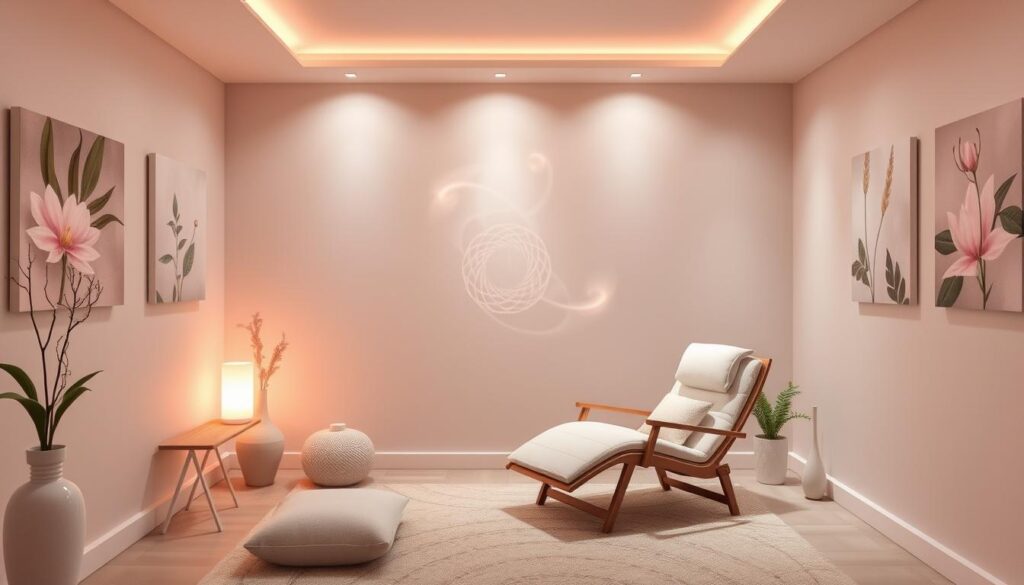 More mental health experts are seeing the value of sleep hypnosis for anxiety and depression. Studies show it can be as effective as traditional treatments, if not more so.
More mental health experts are seeing the value of sleep hypnosis for anxiety and depression. Studies show it can be as effective as traditional treatments, if not more so.
Treatment Protocols
Here’s how sleep hypnosis for depression works:
- First, a detailed psychological check-up is done.
- Then, a hypnotherapy session is tailored just for you.
- Relaxation and visualization techniques are used.
- Cognitive restructuring is done gradually.
- Progress is checked regularly.
Success Rates and Outcomes
Studies show sleep hypnosis is very effective in treating mental health:
| Treatment Metric | Percentage |
|---|---|
| Anxiety Symptom Reduction | 80% |
| Depression Symptom Improvement | 70% |
| Complete Anxiety Relief | 40% |
“Hypnosis offers a unique pathway to addressing deep-seated psychological patterns that traditional therapies might overlook.” – Dr. Ernest Rossi, Clinical Psychologist
Research shows sleep hypnosis works best when combined with other treatments. It can help those with sleep issues due to anxiety or depression find relief.
6 Preparing for Your First Sleep Hypnosis Session
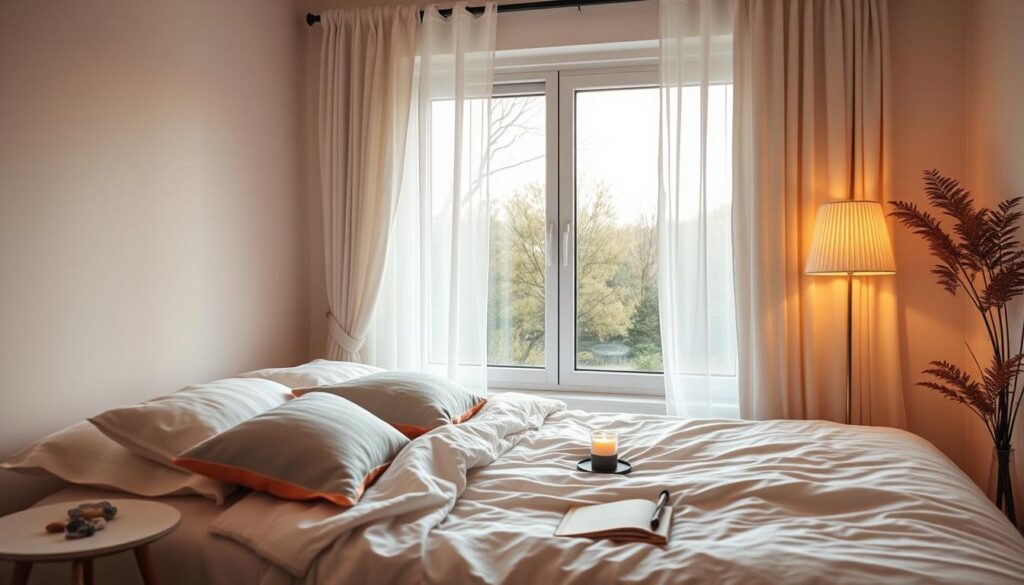 Starting sleep hypnosis for anxiety and depression might seem scary. But knowing what to expect can make you feel better. Since 70% of people deal with anxiety or depression, sleep hypnosis is a hopeful solution. Before your first session, here are some key steps to prepare:
Starting sleep hypnosis for anxiety and depression might seem scary. But knowing what to expect can make you feel better. Since 70% of people deal with anxiety or depression, sleep hypnosis is a hopeful solution. Before your first session, here are some key steps to prepare:
- Research qualified hypnotherapists specializing in sleep hypnosis for anxiety and depression
- Prepare a list of specific symptoms and concerns to discuss
- Wear comfortable, loose-fitting clothing
- Arrive well-rested and hydrated
- Maintain an open and receptive mindset
A typical hypnotherapy session lasts about an hour. Around 90% of people find they relax more during these sessions. This relaxation is key to feeling better.
“Hypnotherapy is a collaborative journey of healing and self-discovery” – Dr. Elizabeth Martinez, Clinical Psychologist
Finding the right professional is very important. A survey showed that over 60% of clients want hypnotherapists with more than basic training.
| Preparation Aspect | Recommended Action |
|---|---|
| Mental Preparation | Practice mindfulness and relaxation techniques |
| Physical Readiness | Get adequate rest before the session |
| Therapeutic Engagement | Be honest and transparent with your therapist |
Remember, active participation increases your likelihood of success by 50%. Go into your sleep hypnosis session with curiosity and hope.
7 Common Techniques Used in Sleep Hypnotherapy
Sleep hypnosis for depression uses special techniques to help people deal with emotional issues and sleep better. Hypnotherapists use different methods to help patients relax their minds and heal emotionally. 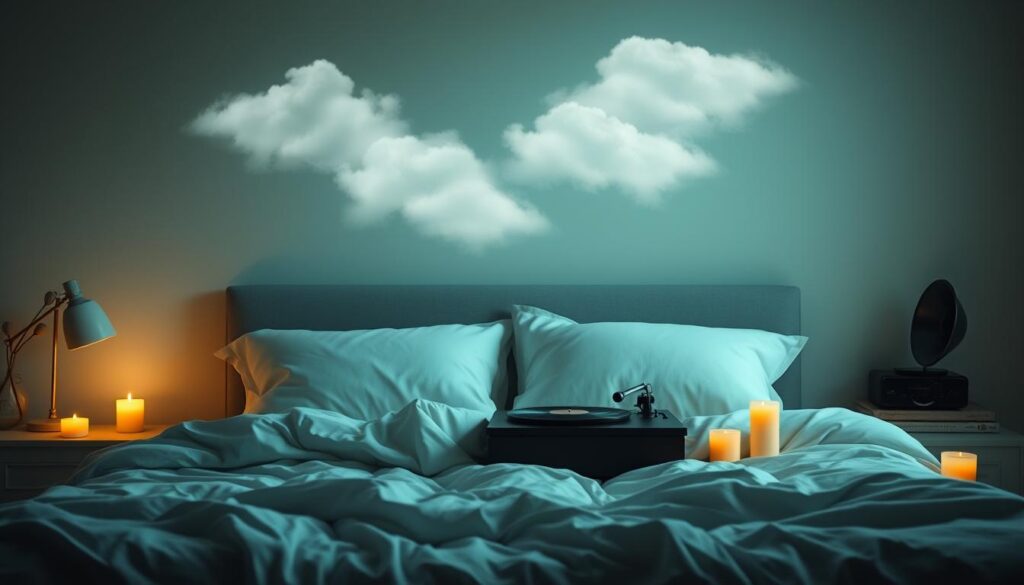 Experts in mental health use many effective methods in sleep hypnotherapy. These methods help with depression and anxiety that affect sleep.
Experts in mental health use many effective methods in sleep hypnotherapy. These methods help with depression and anxiety that affect sleep.
Guided Visualization Methods
Guided visualization is a key part of sleep hypnosis for depression. It helps patients create calm mental scenes. These scenes reduce stress and improve emotional health.
- Create peaceful mental imagery
- Reduce negative thought patterns
- Promote relaxation responses
- Redirect anxious thinking
Progressive Relaxation Techniques
Progressive relaxation helps patients release physical and mental tension. It’s very effective for sleep hypnosis aimed at depression.
| Technique | Primary Benefit | Duration |
|---|---|---|
| Body Scanning | Muscle Tension Release | 10-15 minutes |
| Breathing Visualization | Anxiety Reduction | 5-10 minutes |
| Mental Reset | Thought Pattern Modification | 15-20 minutes |
“Hypnotherapy offers a gentle pathway to healing, helping individuals reconnect with their inner strength and resilience.” – Dr. Elizabeth Roberts, Clinical Psychologist
People who try sleep hypnosis for depression often see big improvements. They feel better emotionally and sleep better too. The mix of visualization and relaxation is a complete way to tackle mental health issues.
8 Combining Sleep Hypnosis with Other Treatment Methods
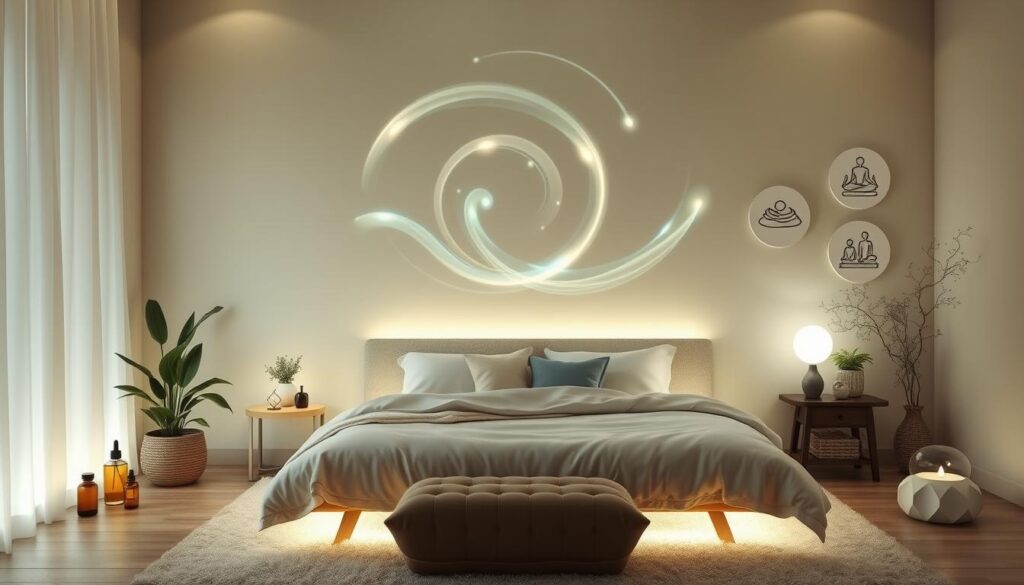 Sleep hypnosis works well with other treatments to help with mental health. It’s great for those with depression and anxiety. A mix of therapies can really help.
Sleep hypnosis works well with other treatments to help with mental health. It’s great for those with depression and anxiety. A mix of therapies can really help.
“Sleep hypnosis appears most effective when complementing traditional therapeutic approaches,” notes mental health experts.
There are a few ways to mix sleep hypnosis with other treatments:
- Cognitive Behavioral Therapy (CBT) integration
- Medication management support
- Complementary relaxation techniques
- Personalized mental health intervention
Research shows sleep hypnosis works best with other treatments. A study in Sleep Medicine Reviews found big improvements. Hypnotherapy with CBT was 40% more effective than just one. People with depression and sleep issues can get better with the right mix of treatments. It helps with both mind and body, leading to better sleep and less stress. Benefits of combining treatments include:
- Faster sleep onset
- Reduced nighttime awakenings
- Enhanced overall sleep quality
- Improved mental health management
Custom plans for each person can lead to a 50% better sleep outcome. Doctors can work together to create a full plan. This tackles the link between sleep, depression, and anxiety.
Research even suggests that products like melatonin supplements or natural sleep aids such as valerian root or chamomile can complement therapies like sleep hypnosis to enhance results.
[lasso id=”14″ link_id=”194″ type=”table”]
9 Safety Considerations and Potential Side Effects
Sleep hypnosis for anxiety and depression is promising but safety is key. It’s generally safe, but some precautions are needed for the best mental health results. 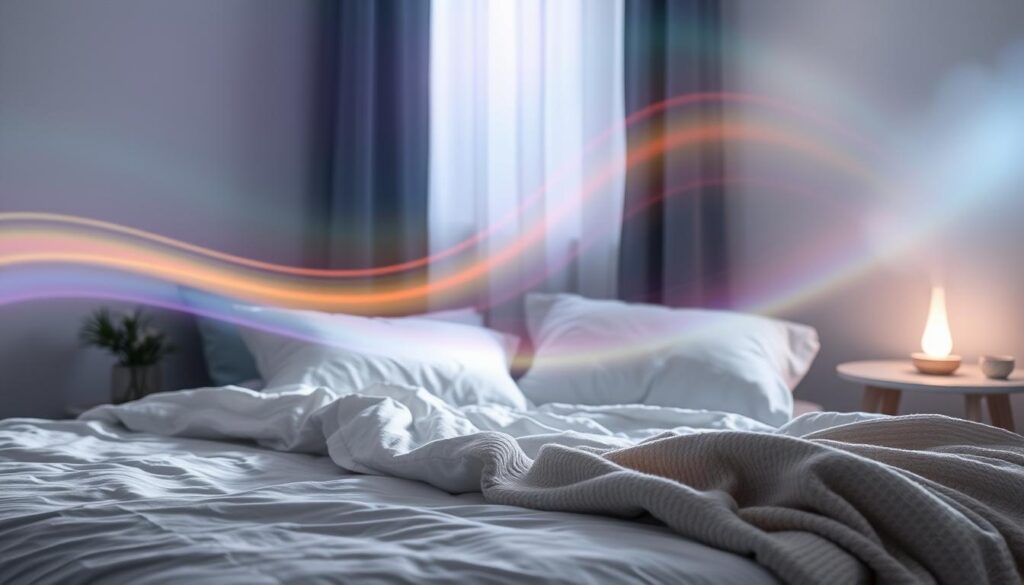 Experts say sleep hypnosis can help with anxiety and depression. But, it’s important for people to know what they’re getting into.
Experts say sleep hypnosis can help with anxiety and depression. But, it’s important for people to know what they’re getting into.
Who Should Exercise Caution
Some people should be careful with sleep hypnosis. If you have certain mental health issues, talk to a doctor first:
- Individuals with psychotic disorders
- People experiencing active hallucinations
- Patients with severe bipolar disorder
- Those with uncontrolled seizure disorders
Potential Side Effects
Most people find sleep hypnosis safe, but some might feel a few side effects:
| Side Effect | Frequency | Duration |
|---|---|---|
| Headache | Rare | Short-term |
| Dizziness | Uncommon | Temporary |
| Mild Anxiety | Occasional | Brief |
Recognizing Contraindications
“Hypnosis is a collaborative process that requires mutual trust and professional guidance” – American Psychological Association
Doctors stress the need for careful checks before starting sleep hypnosis. Those with complex mental health histories need a detailed review to see if it’s right for them. Worldwide, about 4% of people deal with anxiety disorders. This shows how crucial safe, effective treatments like sleep hypnosis are.
10 Long-term Effects of Sleep Hypnosis on Mental Health
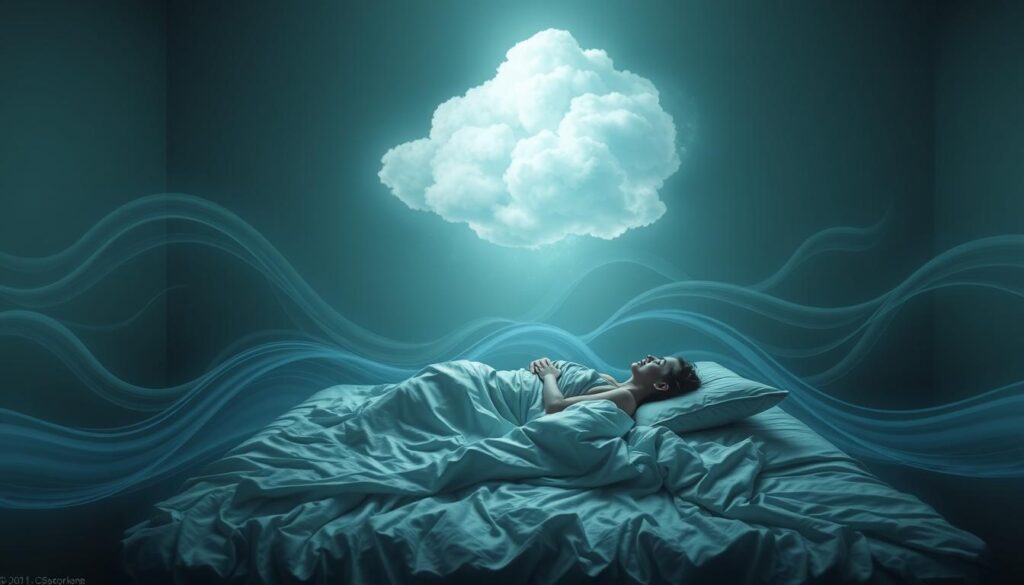 Sleep hypnosis for depression shows great promise for long-term mental health gains. Studies suggest that regular hypnotherapy can lead to lasting improvements in mental health. About 15% of people are very open to hypnosis, which can lead to big positive changes.
Sleep hypnosis for depression shows great promise for long-term mental health gains. Studies suggest that regular hypnotherapy can lead to lasting improvements in mental health. About 15% of people are very open to hypnosis, which can lead to big positive changes.
“Hypnosis can be a transformative tool for rewiring negative thought patterns associated with depression and anxiety.”
Some of the main long-term benefits of sleep hypnosis are:
- Improved sleep quality
- Reduced anxiety symptoms
- Enhanced mood regulation
- Decreased depressive episodes
Scientific studies give us some interesting facts about sleep hypnosis:
| Research Metric | Percentage |
|---|---|
| Studies Showing Sleep Benefit | 58.3% |
| Mixed Results | 12.5% |
| No Observed Benefit | 29.2% |
While promising, experts emphasize the need for more comprehensive research to fully understand sleep hypnosis for depression’s long-term psychological impact. About one-third of people may not respond well to hypnotic techniques. Regular practice and professional help can enhance the mental health benefits. This makes sleep hypnosis a valuable addition to treatments for depression and anxiety.
11 Finding a Qualified Sleep Hypnotherapist
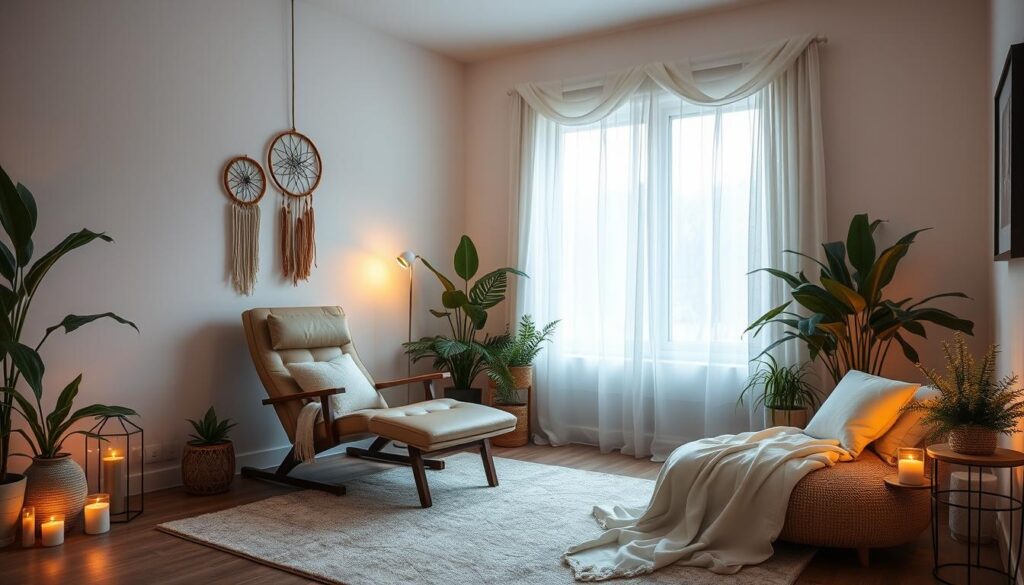 Finding the right sleep hypnosis professional for anxiety and depression is important. Not all experts are the same in using hypnotherapy for mental health.
Finding the right sleep hypnosis professional for anxiety and depression is important. Not all experts are the same in using hypnotherapy for mental health.
“The right hypnotherapist can be a transformative partner in your mental health journey.” – Mental Health Professionals Association
When looking for a sleep hypnotherapist, consider these key points:
- Professional certifications from recognized organizations
- Specialized training in sleep hypnosis for anxiety and depression
- Minimum clinical experience in mental health treatment
- Proven track record of successful patient outcomes
Check with these organizations to verify a therapist’s credentials:
| Organization | Specialization | Membership Requirements |
|---|---|---|
| American Society of Clinical Hypnosis (ASCH) | Mental Health Hypnotherapy | 40 hours workshop training, 20 hours individual training |
| American Association of Professional Hypnotherapists | Comprehensive Hypnosis Practice | Advanced clinical certification |
About 25% of people can’t be hypnotized. This shows why it’s crucial to find a skilled therapist who knows how to help you. When talking to potential therapists, ask about their approach to sleep-related mental health issues. Also, ask for references or success rates. Make sure they are licensed, accept insurance, and know their session costs.
12 Creating a Conducive Environment for Sleep Hypnosis
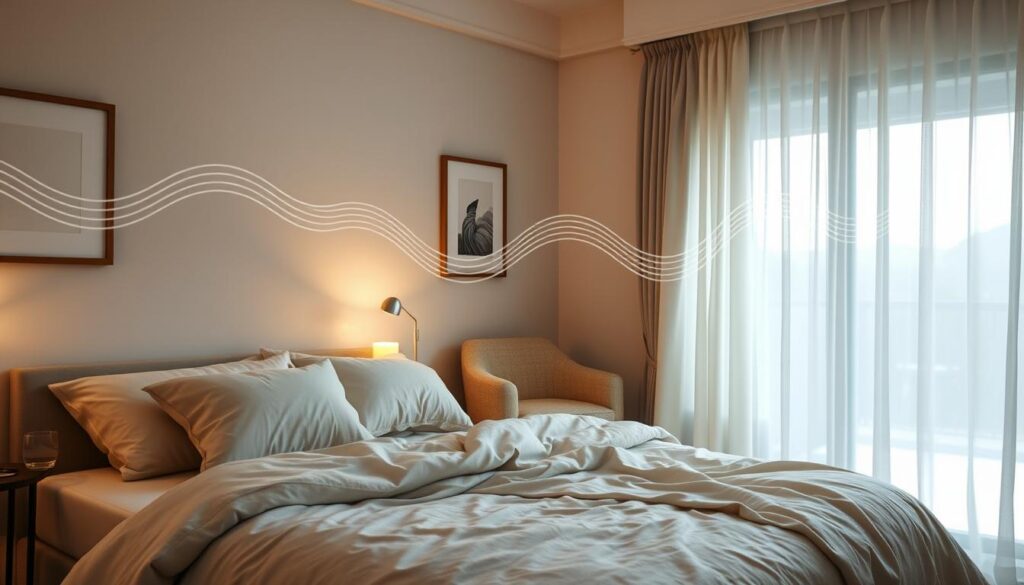 When looking into how depression can lead to more sleep, setting up the right space is key for sleep hypnosis. Studies show that 30% of people face insomnia, making a thoughtful approach to sleep areas vital. To design the best sleep hypnosis space, consider these points:
When looking into how depression can lead to more sleep, setting up the right space is key for sleep hypnosis. Studies show that 30% of people face insomnia, making a thoughtful approach to sleep areas vital. To design the best sleep hypnosis space, consider these points:
- Keep external noise down
- Keep the room temperature between 60-67°F
- Use soft, dim lights to relax
- Take out electronic devices that might break your focus
Stress can really mess with sleep, affecting up to 60% of people. Creating a special relaxation area tells your brain it’s time to relax. This might help fight depression’s impact on sleep.
“Your sleep environment is a sanctuary for mental restoration and healing.” – Sleep Research Institute
Setting up your space right can make sleep hypnosis work better. Studies show that the right setup can improve sleep by 15-30%. This could help reduce depression’s effect on sleeping too much.
- Choose calming colors like blues and greens
- Use white noise machines
- Try weighted blankets for extra comfort
- Stick to a bedtime routine
By using these tips, you can make a perfect space for sleep hypnosis. This might help tackle mental health issues and lead to better sleep.
13 Conclusion
Sleep hypnosis is a promising way to treat anxiety and depression. Studies show it works as well as traditional therapy for mild to moderate depression. It offers hope to those struggling with sleep and emotional issues. This method targets the core of anxiety and depression. It helps people relax and develop better sleep habits. Many Americans have found relief from sleep and emotional problems. Getting help from a professional is key when trying sleep hypnosis. While it’s very promising, everyone reacts differently. Most see improvements in a few sessions, with women responding more often. Investing in hypnotherapy, costing $100 to $250 per session, is worth it for mental health. It’s a step towards better sleep and overall wellness. People should talk to licensed therapists to find the best treatment for them.










